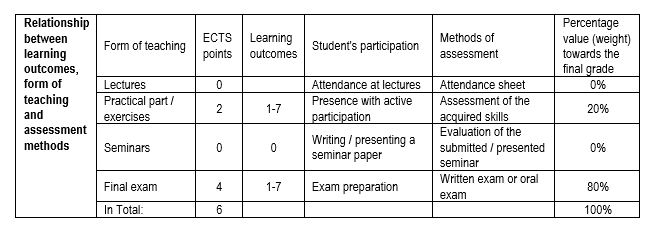Acquirement of knowledge and skills necessary for planning and programming physiotherapeutic procedure, and selection and usage of physiotherapeutic procedures in accordance with users’ needs. By acquirement of course content the students will gain knowledge and skills necessary for controlling and acquirement of course content in specific discipline.
Physical factors in therapy, P-35: Electrodynamic procedures that precede the physical therapy conducting, electrotherapy, electrostimulation, thermotherapy and thermo-diagnostics, ultrasound therapy, light therapy, paraffin therapy, magneto-therapy, hydrotherapy, cryotherapy and cryokinetics, laser therapy, balneology and climatology.
Therapeutic practices as part of physiotherapeutic procedures, P-35: activities for power increase, range of motion, endurance, coordination, motoric control and motoric learning, motoric development and motoric security, posture improvement and respiration, activities of aerobic endurance by the ergometry usage, mini stair masters, weights, pulleys, hydraulics, elastic bandages, robotics, mechanic and electro-mechanics means; strength increase through active movement, actively supported movement and movement with resistance; stretching; exercises on therapeutic ball; exercises in water; breathing exercises and muscle exercises that participate in breathing; breathing strategies; walk trainings, locomotion and balance; trainings of balance and coordination; ergonometric trainings.
Techniques of manual therapy, P-30: Conducting of techniques of manual therapy in clinical conditions; massage therapy, massage of connective tissue, manual lymph drainage, acupressure massage, manual traction, mobility and joint manipulation, mobilization, and soft tissue manipulation.
Respiratory therapy, P-30: breathing techniques, mechanism of coughing, mobilisations, and transport of secretion, drainage positions, relaxation methods, thorax mobilisation, respiratory trainings, and inhalation trainings. Functional trainings of self-care and care at home as part of physiotherapeutic process, L-20: activities in everyday life and instrumental activities of everyday life. Usage of equipment, orthosis, adaptive, protective and supportive means and equipment, L-15: usage of adaptive equipment: equipment:crutches, sticks, walkers, trolleys, static and dynamic splints; usage of orthotic devices: splints, bandages, pads; protective equipment: bandages, protective bandages, pillows; usage of supportive equipment: supportive bandages, compressive bandages, corsets, collars, elastic bandages.
Obavezna literatura:
Upon completion of this course, students will be able to:
- Recommend the application of appropriate physical factors within the physiotherapy process
- Select appropriate forms of therapeutic exercises within the physiotherapy process
- To recommend appropriate techniques of manual and respiratory therapy within the physiotherapeutic process
- Propose appropriate functional training procedures for self-care and household care within the physiotherapy process
- Manage the process of conducting appropriate physical agents in the process of physiotherapy procedure
- Valorize and manage the process of conducting therapeutic exercises, manual and respiratory therapy within the physiotherapy process
- Select appropriate procedures for the application of aids, orthoses, adaptive, protective, supportive means and equipment within the physiotherapy process



